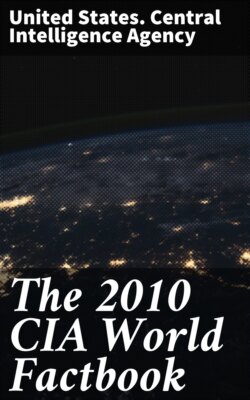Читать книгу The 2010 CIA World Factbook - United States. Central Intelligence Agency - Страница 358
На сайте Литреса книга снята с продажи.
NA
ОглавлениеGovernment ::Congo, Democratic Republic of the
Country name:
conventional long form: Democratic Republic of the Congo
conventional short form: DRC
local long form: Republique Democratique du Congo
local short form: RDC
former: Congo Free State, Belgian Congo, Congo/Leopoldville, Congo/Kinshasa, Zaire
abbreviation: DRC
Government type:
republic
Capital:
name: Kinshasa
geographic coordinates: 4 19 S, 15 18 E
time difference: UTC+1 (six hours ahead of Washington, DC during Standard Time)
Administrative divisions:
10 provinces (provinces, singular - province) and 1 city* (ville); Bandundu, Bas-Congo, Equateur, Kasai-Occidental, Kasai-Oriental, Katanga, Kinshasa*, Maniema, Nord-Kivu, Orientale, Sud-Kivu
note: according to the Constitution adopted in December 2005, the current administrative divisions will be subdivided into 26 new provinces by 2009
Independence:
30 June 1960 (from Belgium)
National holiday:
Independence Day, 30 June (1960)
Constitution:
18 February 2006
Legal system:
civil law based on Belgian law with Napoleonic Civil Code influence; accepts compulsory ICJ jurisdiction with reservations
Suffrage:
18 years of age; universal and compulsory
Executive branch:
chief of state: President Joseph KABILA (since 17 January 2001);
head of government: Prime Minister Adolphe MUZITO (since 10 October 2008)
cabinet: Ministers of State appointed by the president (For more information visit the World Leaders website ) elections: under the new constitution the president elected by popular vote for a five-year term (eligible for a second term); elections last held on 30 July 2006 and on 29 October 2006 (next to be held on 27 November 2011); prime minister appointed by the president
election results: Joseph KABILA elected president; percent of vote (second round) - Joseph KABILA 58%, Jean-Pierre BEMBA Gombo 42%
note: Joseph KABILA succeeded his father, Laurent Desire KABILA, following the latter's assassination in January 2001; negotiations with rebel leaders led to the establishment of a transitional government in July 2003 with free elections held on 30 July 2006 and a run-off on 29 October 2006 confirming Joseph KABILA as president
Legislative branch:
bicameral legislature consists of a Senate (108 seats; members elected by provincial assemblies to serve five-year terms) and a National Assembly (500 seats; 61 members elected by majority vote in single-member constituencies, 439 members elected by open list proportional-representation in multi-member constituencies to serve five-year terms)
elections: Senate - last held on 19 January 2007 (next to be held on 27 November 2011); National Assembly - last held on 30 July 2006 (next to be held on 27 November 2011)
election results: Senate - percent of vote by party - NA; seats by party - PPRD 22, MLC 14, FR 7, RCD 7, PDC 6, CDC 3, MSR 3, PALU 2, independents 26, others 18 (political parties that won a single seat); National Assembly - percent of vote by party - NA; seats by party - PPRD 111, MLC 64, PALU 34, MSR 27, FR 26, RCD 15, independents 63, others 160 (includes 63 political parties that won 10 or fewer seats)
Judicial branch:
Constitutional Court; Appeals Court or Cour de Cassation; Council of State; High Military Court; plus civil and military courts and tribunals
Political parties and leaders:
Christian Democrat Party or PDC [Jose ENDUNDO]; Congolese Rally for
Democracy or RCD [Azarias RUBERWA]; Convention of Christian
Democrats or CDC; Forces of Renewal or FR [Mbusa NYAMWISI]; Movement
for the Liberation of the Congo or MLC [Jean-Pierre BEMBA]; People's
Party for Reconstruction and Democracy or PPRD [Joseph KABILA];
Social Movement for Renewal or MSR [Pierre LUMBI]; Unified Lumumbist
Party or PALU [Antoine GIZENGA]; Union for Democracy and Social
Progress or UDPS [Etienne TSHISEKEDI]; Union of Mobutuist Democrats
or UDEMO [MOBUTU Nzanga]
Political pressure groups and leaders:
MONUC - UN organization working with the government; FARDC (Forces
Armees de la Republique Democratique du Congo) - Army of the
Democratic Republic of the Congo which commits atrocities on
citizens; FDL (Forces Democratiques de Liberation du Rwanda) -
Rwandan militia group
International organization participation:
ACP, AfDB, AU, CEPGL, COMESA, FAO, G-24, G-77, IAEA, IBRD, ICAO,
ICCt, ICRM, IDA, IFAD, IFC, IFRCS, IHO, ILO, IMF, IMO, Interpol,
IOC, IOM, IPU, ISO, ITSO, ITU, ITUC, MIGA, NAM, OIF, OPCW, PCA,
SADC, UN, UNCTAD, UNESCO, UNHCR, UNIDO, UNWTO, UPU, WCO, WFTU, WHO,
WIPO, WMO, WTO
Diplomatic representation in the US:
chief of mission: Ambassador Faida MITIFU
chancery: Suite 601, 1726 M Street, NW, Washington, DC, 20036
telephone: [1] (202) 234–7690 through 7691
